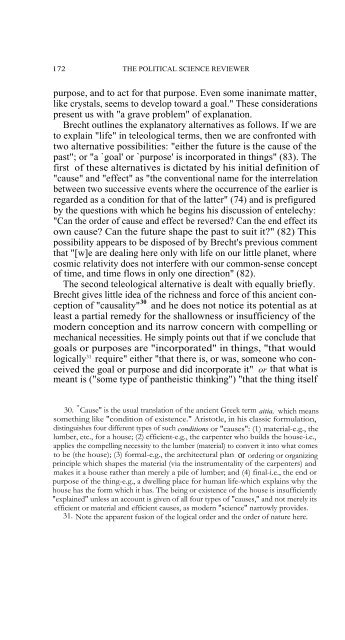ARNOLD BRECHT'S POLITICAL THEORY REVISITED Political ...
ARNOLD BRECHT'S POLITICAL THEORY REVISITED Political ...
ARNOLD BRECHT'S POLITICAL THEORY REVISITED Political ...
You also want an ePaper? Increase the reach of your titles
YUMPU automatically turns print PDFs into web optimized ePapers that Google loves.
172 THE <strong>POLITICAL</strong> SCIENCE REVIEWER<br />
purpose, and to act for that purpose. Even some inanimate matter,<br />
like crystals, seems to develop toward a goal." These considerations<br />
present us with "a grave problem" of explanation.<br />
Brecht outlines the explanatory alternatives as follows. If we are<br />
to explain "life" in teleological terms, then we are confronted with<br />
two alternative possibilities: "either the future is the cause of the<br />
past"; or "a `goal' or `purpose' is incorporated in things" (83). The<br />
first of these alternatives is dictated by his initial definition of<br />
"cause" and "effect" as "the conventional name for the interrelation<br />
between two successive events where the occurrence of the earlier is<br />
regarded as a condition for that of the latter" (74) and is prefigured<br />
by the questions with which he begins his discussion of entelechy:<br />
"Can the order of cause and effect be reversed? Can the end effect its<br />
own cause? Can the future shape the past to suit it?" (82) This<br />
possibility appears to be disposed of by Brecht's previous comment<br />
that "[w]e are dealing here only with life on our little planet, where<br />
cosmic relativity does not interfere with our common-sense concept<br />
of time, and time flows in only one direction" (82).<br />
The second teleological alternative is dealt with equally briefly.<br />
Brecht gives little idea of the richness and force of this ancient conception<br />
of "causality" 30 and he does not notice its potential as at<br />
least a partial remedy for the shallowness or insufficiency of the<br />
modern conception and its narrow concern with compelling or<br />
mechanical necessities. He simply points out that if we conclude that<br />
goals or purposes are "incorporated" in things, "that would<br />
logically 31 require" either "that there is, or was, someone who conceived<br />
the goal or purpose and did incorporate it" or that what is<br />
meant is ("some type of pantheistic thinking") "that the thing itself<br />
30. " Cause" is the usual translation of the ancient Greek term aitia, which means<br />
something like "condition of existence." Aristotle, in his classic formulation,<br />
distinguishes four different types of such conditions or "causes": (1) material-e.g., the<br />
lumber, etc., for a house; (2) efficient-e.g., the carpenter who builds the house-i.e.,<br />
applies the compelling necessity to the lumber (material) to convert it into what comes<br />
to be (the house); (3) formal-e.g., the architectural plan or ordering or organizing<br />
principle which shapes the material (via the instrumentality of the carpenters) and<br />
makes it a house rather than merely a pile of lumber; and (4) final-i.e., the end or<br />
purpose of the thing-e.g., a dwelling place for human life-which explains why the<br />
house has the form which it has. The being or existence of the house is insufficiently<br />
"explained" unless an account is given of all four types of "causes," and not merely its<br />
efficient or material and efficient causes, as modern "science" narrowly provides.<br />
31. Note the apparent fusion of the logical order and the order of nature here.
















